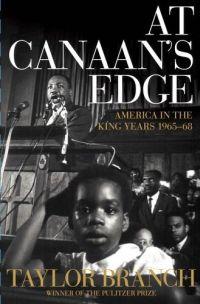

Purchase
At Canaan's Edge concludes America in the King Years, a three-volume history that will endure as a masterpiece of storytelling on American race, violence, and democracy.
Simon and Schuster
January 2006
1056 pages
ISBN: 068485712X
Hardcover
Add to Wish List
Non-Fiction Biography
Pulitzer Prize-winner and bestselling author Taylor Branch
makes clear in this magisterial account of the civil rights
movement that Martin Luther King, Jr., earned a place next
to James Madison and Abraham Lincoln in the pantheon of
American history. In At Canaan's Edge, King and
his movement stand at the zenith of America's defining
story, one decade into an epic struggle for the promises of
democracy. Branch opens with the authorities' violent
suppression of a voting-rights march in Alabama on March 7,
1965. The quest to cross Selma's Edmund Pettus Bridge
engages the conscience of the world, strains the civil
rights coalition, and embroils King in negotiations with all
three branches of the U.S. government. The marches
from Selma coincide with the first landing of large U.S.
combat units in South Vietnam. The escalation of the war
severs the cooperation of King and President Lyndon Johnson
after a collaboration that culminated in the landmark 1965
Voting Rights Act. After Selma, young pilgrims led by
Stokely Carmichael take the movement into adjacent Lowndes
County, Alabama, where not a single member of the black
majority has tried to vote in the twentieth century. Freedom
workers are murdered, but sharecroppers learn to read, dare
to vote, and build their own political party. Carmichael
leaves in frustration to proclaim his famous black power
doctrine, taking the local panther ballot symbol to become
an icon of armed rebellion. Also after Selma, King
takes nonviolence into Northern urban ghettoes. Integrated
marches through Chicago expose hatreds and fears no less
virulent than the Mississippi Klan's, but King's 1966
settlement with Mayor Richard Daley does not gain the kind
of national response that generated victories from
Birmingham and Selma. We watch King overrule his advisers to
bring all his eloquence into dissent from the Vietnam War.
We watch King make an embattled decision to concentrate his
next campaign on a positive compact to address poverty. We
reach Memphis, the garbage workers' strike, and King's
assassination. Parting the Waters provided an
unsurpassed portrait of King's rise to greatness, beginning
with the 1955 Montgomery bus boycott and ending with the
assassination of President John F. Kennedy in 1963. In
Pillar of Fire, theologians and college students
braved the dangerous Mississippi Freedom Summer of 1964 as
Malcolm X raised a militant new voice for racial separatism.
The Civil Rights Act of 1964 outlawed segregation by race
and mandated equal opportunity for women. From the pinnacle
of winning the Nobel Peace Prize, King willed himself back
to "the valley" of jail in his daunting Selma
campaign. At Canaan's Edge portrays King at the
height of his moral power even as his worldly power is
waning. It shows why his fidelity to freedom and nonviolence
makes him a defining figure long beyond his brilliant life
and violent end.
Comments
No comments posted.
Registered users may leave comments.
Log in or register now!
| 


 © 2003-2025 off-the-edge.net
all rights reserved Privacy Policy
© 2003-2025 off-the-edge.net
all rights reserved Privacy Policy